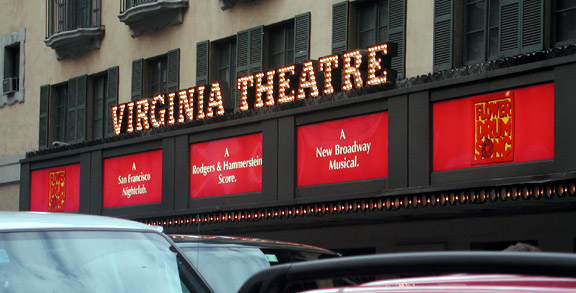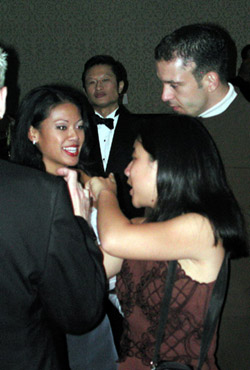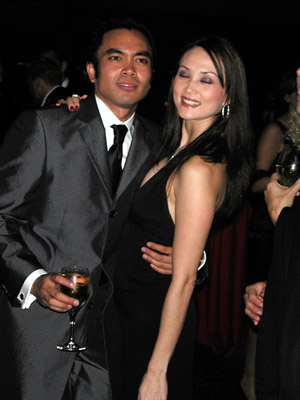

From a critical viewpoint, some thoughts emerged after thinking about the show for a few weeks:
- To Rodgers and Hammerstein purists: Fuck Off and Die.
Having had some heated...discussion...with some R&H purists over the past few months, there's no other way to express myself (folks who read Usenet's rec.arts.theatre.musicals will know what and who I mean). After interminable messages about how "Hwang is desecrating a classic", "Hwang should have gotten his own play", "Hwang should have let the show alone, as its creators intended it", it clear that the purists don't get it. Hwang DID talk to the creators and he IS making the show as he intended it. It's just that he, unlike them, realize the ultimate creator and author of Flower Drum Song is C. Y. Lee...who is, after all, still alive and gave his consent to the new version. (Of course, there are those who imply that the ultimate authorship really belongs to Rodgers & Hammerstein, since it was they who popularized the show. And all I can say to them is...FOAD. Again.)
This can be seen most clearly in the handling of some of the major ballads. In the original, A Hundred Million Miracles is a quaint bit of quasi-Oriental philosophy, as expressed from father to daughter ("Ah, Grasshopper...there are many miracles around you if only you would stop to look"). Hwang takes this song and juxtaposes it against the immigrant journey to America. The song ends with incoming refugees marveling at the American Dream and the very real, concrete opportunities it offers to them: riches, mobility and freedom. We see for ourselves that a hundred million miracles actually do occur everyday (well, everybody except for a few mush-headed leftist intellectual snobs too cynical to recognize what a miracle it is to be in America) (naming no names, Mr. Brantley and NY Times....).
Similarly, Hwang takes the ballad I Am Going to Like it Here and parallels the singing of Ta and Mei Lei on stage with a fantasy dance of the old tale of the goddess and the s cholar. The deepening romance of both couples are mirrored in the singing and dancing; it elevates a sweet ballad into a lyrical fusion of dance and song that is almost unbearably beautiful to watch.
cholar. The deepening romance of both couples are mirrored in the singing and dancing; it elevates a sweet ballad into a lyrical fusion of dance and song that is almost unbearably beautiful to watch.
- This is very much an Asian American show
It embodies both the more revisionistic viewpoint on America that was developed by activists of the 60s and 70s, as well as the more broader, sympathetic view of America as held by Asian Americans in the 40s and 50s. In other words, I see pieces of both myself and my father, and our attitudes toward the US and music in this show. [This was, perhaps the most surprising thing about it]. It's an underappreciated nuance in this show, but I think it's a most accurate reflection of Chinese American thought and attitudes, and much less revisionist than other Asian American pieces of this era. It's a more personal perspective than the obvious ones; while it's clear to Asian American historians that the night club in Flower Drum Song is derived from the real Forbidden City in San Francisco (and its compatriots on the Chop Suey circuit in LA, NY, Seattle and other places), it's not as often recognized how much the Asian American artists really loved doing that kind of work. - There are some fabulous performances here (and not just from the usual suspects)
* Jose Llana was fabulous as Ta, both acting and singing. Given that he's not a winsome Asian lass of lotus blossom heritage, he won't get any offers for other shows. That's America's loss, as he deserves a hell of a lot better than the typical pigeonholing of Asian actors.
winsome Asian lass of lotus blossom heritage, he won't get any offers for other shows. That's America's loss, as he deserves a hell of a lot better than the typical pigeonholing of Asian actors.
* Ditto for Hoon Lee as Chao. He has a palpable, brooding presence (not unlike Judd in Oklahoma) that immediately caught my eye. A veteran of the NY Asian American theatre scene, he's stage presence personified, even with just a handful of lines.
* Sandra Allen--great presence on stage, great voice and considerable savoi faire with her costumes. (You thought I was going to say something sexist like "great legs", too, didn't you.....)
* Alvin Ing. How can you NOT like someone who was in the cast when it first toured??? And he got a moving, beautiful ballad to boot!
* Randall Duk Kim - one of the best Shakespearean actors you never heard of, does a great job with a difficult transition from traditionalist to "Sammy Fong" (a persona obviously based on the real Charlie Low, who ran SF's Forbidden City).
*And let's not forget Jodie Long, herself a daughter of former performers at Forbidden City, who brings Madame Liang to life with flair and more than a little vinegar for a welcome bit of bitchiness.

- That said, some flaws:
* The transition from Wang to Sammy Fong is a bit undefined. While it's quite common to have the traditionalist and the stage ham inhabit the same body (Um, hi, Dad....), it's a bit of a whiplash to see the two in this show. Perhaps a few more of the steps in the transition would have helped.
* Ack! More Linda Low! The character sort of fades out in the second act, and I think could have done more.
* Sorry, but the new character of Harvard as a swishy stereotype was, I feel, a wasted opportunity. The stage was one of the few opportunities for gay Asians to feel free and uncloseted, and a bit of pathos among the levity to point this out would not have been out of place.
On the whole, however, Flower Drum Song was a show I absolutely loved. It contained a whole passle of elements that I wanted to see in an Asian American musical. It thrilled me and moved me deeply (no, I was NOT crying during some of the songs, Nihei!) and it had some real lessons on the ambivalent nature of Americanization for Asian American. It sounds trite, but it's a must see show for Asian Americans to see in New York, as it represents some real substance alloyed with the traditional razzamatazz of Broadway entertainment take from the Golden Age of musicals.
Home | News | Calendar | Directory | Library | Plays
Questions? Email gwangung@u.washington.edu